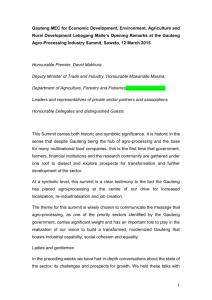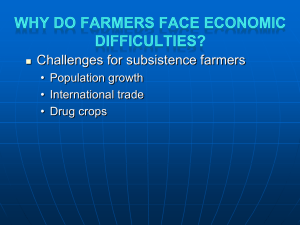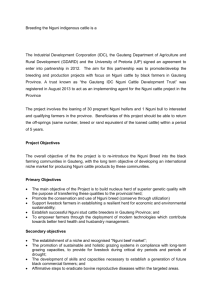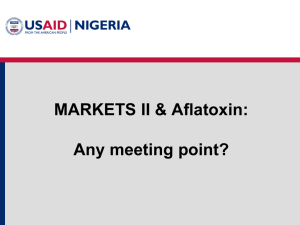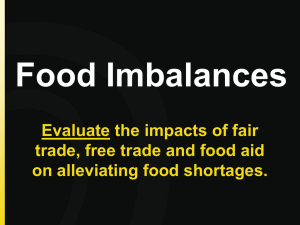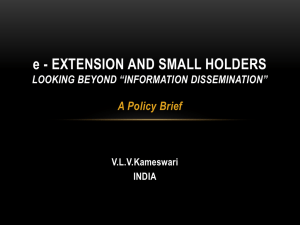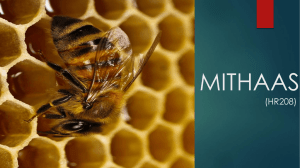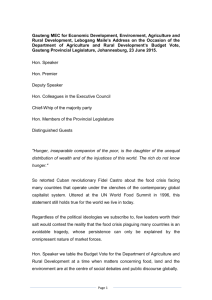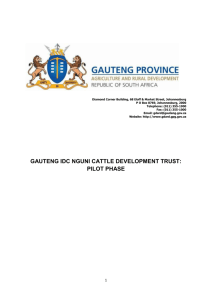MEC Lebohang Maile speech during the Launch of the Nguni Cattle
advertisement
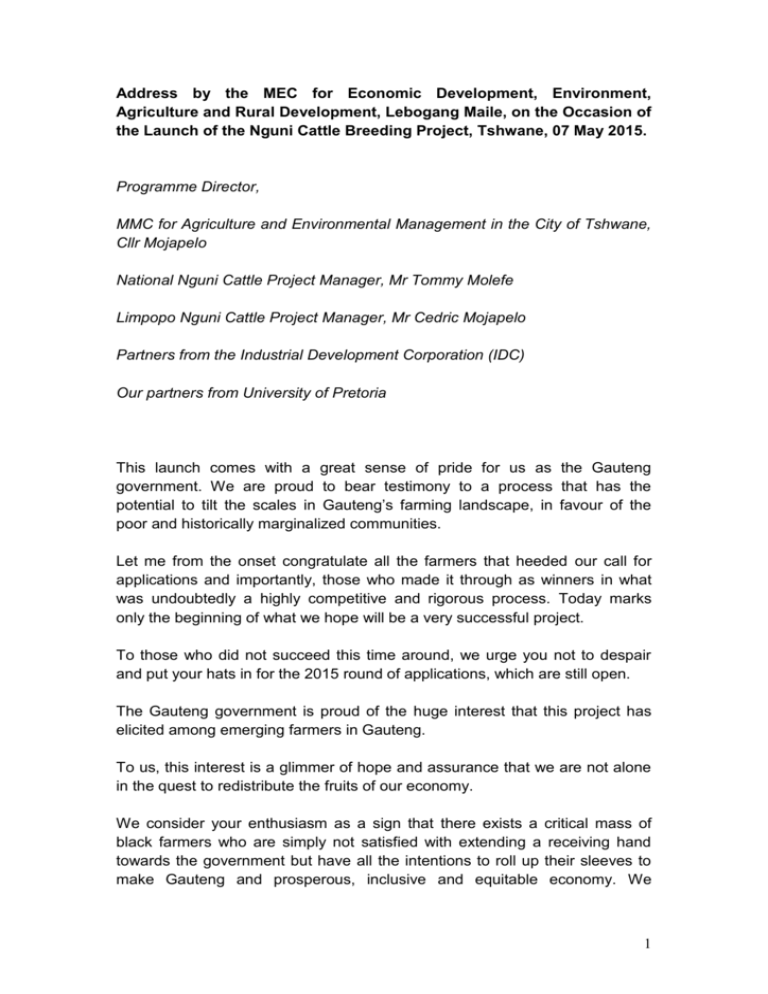
Address by the MEC for Economic Development, Environment, Agriculture and Rural Development, Lebogang Maile, on the Occasion of the Launch of the Nguni Cattle Breeding Project, Tshwane, 07 May 2015. Programme Director, MMC for Agriculture and Environmental Management in the City of Tshwane, Cllr Mojapelo National Nguni Cattle Project Manager, Mr Tommy Molefe Limpopo Nguni Cattle Project Manager, Mr Cedric Mojapelo Partners from the Industrial Development Corporation (IDC) Our partners from University of Pretoria This launch comes with a great sense of pride for us as the Gauteng government. We are proud to bear testimony to a process that has the potential to tilt the scales in Gauteng’s farming landscape, in favour of the poor and historically marginalized communities. Let me from the onset congratulate all the farmers that heeded our call for applications and importantly, those who made it through as winners in what was undoubtedly a highly competitive and rigorous process. Today marks only the beginning of what we hope will be a very successful project. To those who did not succeed this time around, we urge you not to despair and put your hats in for the 2015 round of applications, which are still open. The Gauteng government is proud of the huge interest that this project has elicited among emerging farmers in Gauteng. To us, this interest is a glimmer of hope and assurance that we are not alone in the quest to redistribute the fruits of our economy. We consider your enthusiasm as a sign that there exists a critical mass of black farmers who are simply not satisfied with extending a receiving hand towards the government but have all the intentions to roll up their sleeves to make Gauteng and prosperous, inclusive and equitable economy. We 1 commend the patience and tenacity you demonstrated throughout the selection process. Programme Director, This initiative marks a significant departure from a perspective that sees empowerment as a process concerned with individuals, without a significant bearing or ripple effect on communities. Through loaning these cattle to farmers who made it through the selection process, we are essentially placing the future of the project on the success of this inaugural phase. In the same light, by accepting the terms that come with this project, farmers are automatically signing up as partners in the development of black farmers and importantly in the mission to transform our economy and promote sustainable livelihoods. The stakes for this project are quite high. The failure of one farmer can and will have an impact on the project in its entirety. I am highlighting this not to dampen the spirits of this joyous occasion, but to ensure that we all understand the mammoth task that rests on our shoulders. To mitigate any threats that may jeopordise the success of this project, we have designed a package deal that includes regular monitoring and evaluation as well as a comprehensive programme to empower farmers with the necessary skills for the upkeep and optimum economic use of the cattle. At the completion of the five-year loan period, we hope to not only collect the loaned animals but to have also produced formidable specialists in the breeding of Nguni cattle and business people who can hold their own in the competitive world of agribusiness and agri-industry. If there was ever a litmus test for our commitment to radical economic transformation, this project would qualify as such. The significance of this project lies in its intricate links to our endevours to overturn a legacy of dispossession and to transform economic ownership patterns. It forms part of government’s contribution to increase the ownership of agricultural and economic assets by black people. The success of this “deal” also depends on how far you are willing to tread the path and challenge prevailing conditions in the agricultural industry where black farmers and enterprises command only a negligible stake. 2 As we launch this initiative, we find comfort in the fact that there are others who have trailed this path before us. While we look towards sister provinces like Limpopo and North West for inspiration and lessons, we are also alive to the reality that Gauteng is, in certain respects, a unique case. Unlike our sister provinces, Gauteng has very limited land resources and occupies only 1.4% of our country’s total land mass. We also have the highest population density with nearly 13 million people residing in the province. As a direct consequence of this reality, our primary agriculture makes a small contribution to our economy. Therefore, for this initiative to have the impactful results we desire, it should not be de-linked from our plans to increase the contribution of agriculture to the provincial economy, especially its value adding aspects. Programme Director, Nearly two months ago we convened no less than a thousand farmers, food companies and other important stakeholders for a summit on the agroprocessing and agribusiness. We convened this summit against the backdrop of increasing food imports and various other challenges facing the agricultural sector. An example of these challenges is the fact that since 2007, our country has become a net importer of food. This effectively means that access to basic staples is highly dependent on unpredictable international markets. Delegates gathered at this summit also convened at a time when the incidence of hunger in the province is at worrying levels. Just under 20% of Gauteng citizens are confronted by hunger and food insecurity on a daily basis. The agro-processing summit confirmed what widely recited facts about the little headway made by black farmers into the tight value chains of food retailers and supermarkets. The resounding message of this summit, which I am certain resonates with many of you present here, is that government must play a proactive role to create bridges between blacks farmers and agribusiness. 3 There was no ambiguity in the expectation that we must support, coordinate and even pioneer partnerships and pave the way for black farmers to be incorporated into the value chains of the food and related industries. We will be making announcements over the next few weeks about what we believe are game-changing partnerships and developments in the agricultural sector. As one of the steps in this direction, we are developing an automated environmental atlas that will provide details about land use and various economic activities that are taking place in different parts of the province at the click of a button. We are also paying particular attention to improving our farmer support system and to make it more effective and responsive through extension services that are oriented to servicing smallholder farmers, targeted capacity building as well as interventions in research and development. I am certain that you are already well appraised with our plans to radically transform the economic landscape some of the Development Corridors that comprise the Gauteng City Region, using agriculture and more importantly agribusiness as a lever. The integration of 32 black farmers to supply barley and maize to Heineken brewery in the Southern Corridor is an unambiguous testament to this commitment. We have take the leisure of sharing some of the outcomes of the agroprocessing with you here today to demonstrate that as farmers and business people in the sector, you are not walking this journey in solitude. Emerging black farmers and our impoverished communities must serve as midwives to the transformative impact we hope to achieve. You are the catalysts that will usher in an era of genuine and through-going transformation – an era where economic prosperity, growth and inclusion coexist peacefully. Programme Director, In view of the challenge of hunger facing our communities, we will, in the next few months, launch a campaign for grassroots mobilisation around hunger and food security. Through this campaign, we seek to inspire a movement of people who are not only concerned about what they put on their tables and the related costs, but pay equal if not more attention to the source of the food that we consume and how communities can reclaim the power that has been 4 taken over by markets. We want to see every school, every ward, every township and neighbourhood taking charge of the nutritional needs of their communities. The unsightly sites illegal dumping sites which emit nothing but stench in our townships and cities must be turned into productive spaces where communities can plant vegetation to meet their nutritional needs. We are simply not comfortable with the facts underscored by the General Household Survey, which shows that from 2002 until 2011, agricultural production at smallholder and subsistence levels is not providing enough food for household consumption. We want to overturn this status quo! Our government’s plans to lead and coordinate efforts to create Agri-Parks and promote Urban Agriculture must be seen in this light. This campaign will breathe new life into our cities and townships; generate income for residents as they can sell their produce to local markets and give young unemployed men and women a sense of hope; and opportunities to enhance their skills and engage in productive agricultural activities. As the Gauteng government, we have every intention of growing the scale and magnitude of this project. Because this is a pilot, we may encounter teething challenges that may require us to make adjustment to certain elements. As we conclude the proceedings of the day, let us be reminded that development is a learning process. We wish to extend our sincere gratitude to our partners, the Industrial Development Corporation (IDC) and the University of Pretoria. You have displayed nothing short of commitment and passion for this project. We also thank all the farmers who showed interest in the project. We can only succeed if the interventions we design are responsive to your needs and aspirations. Thank you. 5
